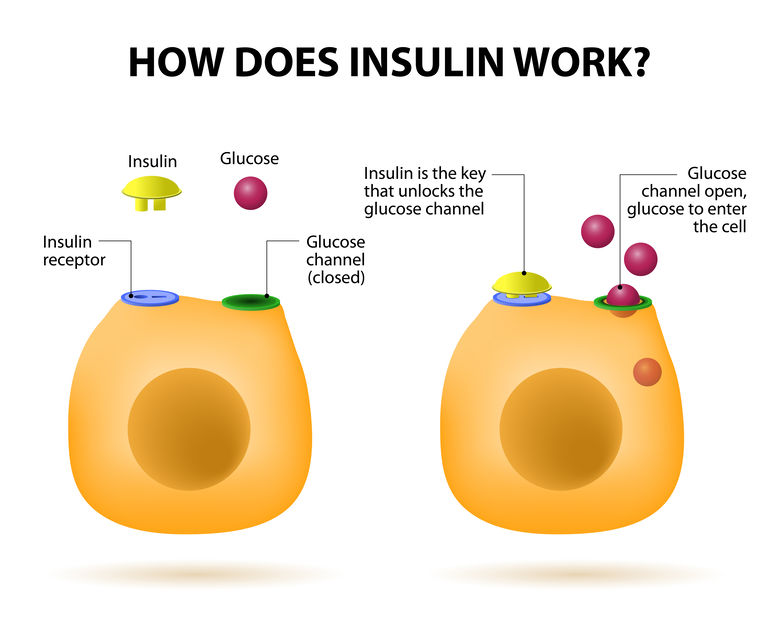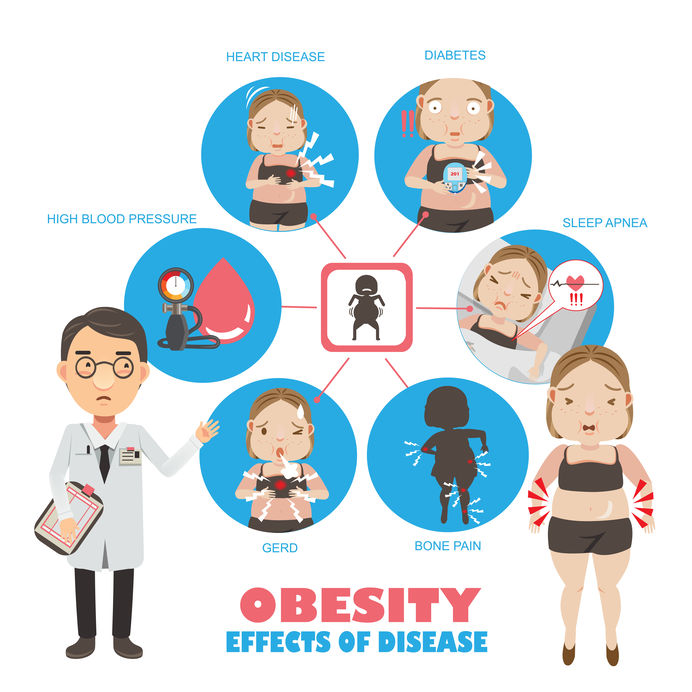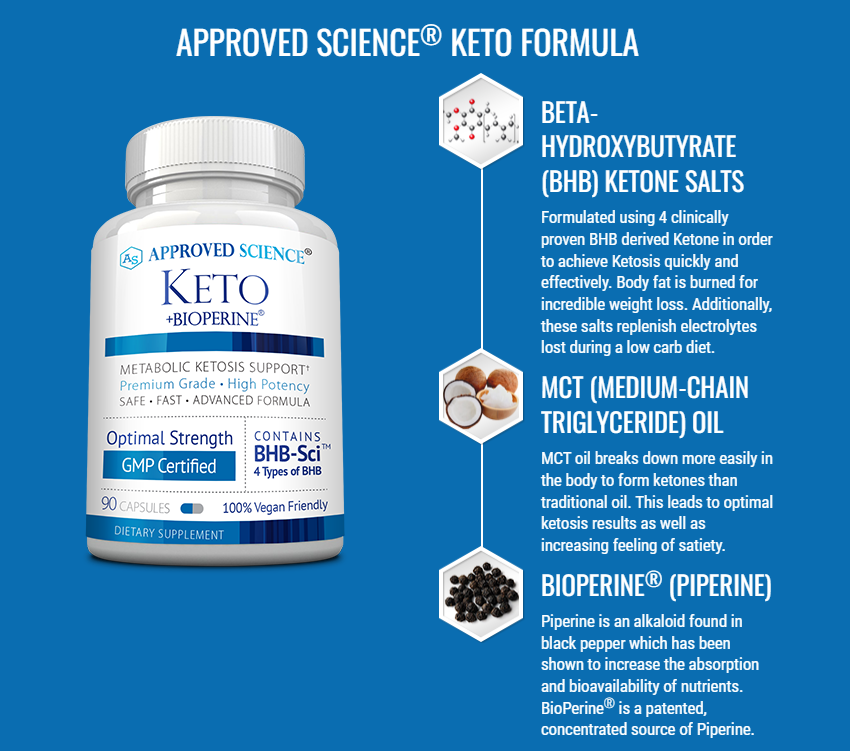What makes Approved Science® Keto different from the scores of keto products sold today? Don’t take our word for it, see what our customers have to say:
“This is simply amazing. I take the daily dosage and the pounds melt right off. So far I have lost over 50 lbs and working on the next 50 lbs. I had my doubts about whether this product was going to work as described and I have been pleasantly surprised with the results.”
– Verified Amazon review
“I have noticed I am not as hungry and have to actually stick to my schedule of meals and snacks so I get in enough nutrition. I have lost weight and bulk that may not yet be reflected in pounds on the scale. I like that it’s natural and doesn’t make me feel awful or medicine-y. It’s easy as taking a multi-vitamin!”
– Verified Amazon review

Anyone can manufacture a keto supplement but making a product that actually works takes legitimate resources such as interpreting clinical studies, working in a research lab and painstakingly formulating the best product possible. Because of this, each ingredient in Approved Science® Keto is a result of a careful formulation in order to pack a punch of ketones which will absorb properly in your body to get you incredible results.
In this Approved Science® Keto review, we’ll take you through the science so you can learn why high-carb diets can spell disaster for most Americans and what the ketogenic diet is proven to do. In addition, we present current scientific research so you can understand for yourself how Approved Science® Keto pills can boost your low-carb diet into real weight loss results.
What Is The Ketogenic Diet?
The ketogenic diet originates back to the 1920s when Dr. Russell Wilder at the Mayo Clinic used it as a therapeutic treatment for pediatric epilepsy. Amazingly, children who did not respond to epilepsy medications were able to live without seizures by following a strict low-carb, high-fat diet.
By the early 2000s, people had caught on to the amazing weight loss effects of the ketogenic diet and were promoting it as simply the next fad diet however, it is so much more than just a passing fad. Most people are completely unaware of the incredible health benefits following a keto diet has for the entire body, apart from losing weight.
How Does The Keto Diet Work?
The science behind the ketogenic diet is not difficult but it does require a basic knowledge of human metabolism. Once you grasp that, it will become clear how Approved Science® Keto pills fit into the whole keto picture. So, here’s a crash course on how the human body metabolizes food for energy:
Biology 101
We all need to eat food in order to acquire energy. The nutrients from food you eat combine with oxygen in order to produce energy through a series of chemical reactions. Metabolism refers to the rate or speed at which these reactions occur. For someone with a fast metabolism, they are very efficient at turning food into energy and producing a lot of it.
How To Lose Weight And Maintain Metabolism

If you deprive your body of food, thereby starving it of nutrients and calories, it will affect your metabolism negatively. As you lose weight, your body gets the message that food is scarce and therefore will slow down metabolism to make the nutrients last as long as they can.
Once you start eating normally again, you’ll gain weight incredibly fast due to your metabolism going at a slow rate. Instead of using the energy obtained from the food, your body will store it to conserve and save it for a later time. This is called metabolic adaptation and has been documented in this 2013 study.
Lean muscle mass helps raise the rate of metabolism. You don’t want to lose muscle when you lose weight because muscles are what keeps your body burning food for energy – even when you’re at rest. Instead, you want to be a fat-burning machine. This is where the keto diet and Approved Science® Keto comes in.
Keto Revs Up Metabolism
The weight you lose from the ketogenic diet is from fat, not from your muscles. As shown in this 2006 study, because you are preserving your muscle mass, you’re able to lose weight without sacrificing your metabolism.
Additionally, going on a keto diet will not only speed up your metabolism and target fat-burning but it actually increases your sensitivity to insulin. This exact mechanism is called ketosis.
Ketones And Their Role In Ketosis
Ketosis is a metabolic state that your body enters which burns fat for energy. When your body needs energy, it first turns to carbs. These are found in your body as their smallest form as glucose. Your body strives to have an optimal balance of glucose in the blood so it is always either adding or taking away glucose depending on what you have eaten.
Your body also has stores of glucose in the liver called glycogen. As you go through your daily activities and have a need for energy, your body will use glucose and glycogen. When glycogen stores are depleted, your body will then turn to the next best option, which is to break down fat as a source of energy.

Normally, when you eat, especially high-carb meals, the amount of glucose in your blood will shoot up. This triggers the release of insulin into your bloodstream. Insulin will then send the message to the cells to:
- Remove glucose from the blood and uptake into the cells
- Convert glucose to glycogen to be stored in the liver
- Stop glycogen from being broken down into glucose
A big problem affecting Americans is insulin resistance, which is when cells lose their sensitivity to insulin. The body will respond by producing even more insulin in order to get the results it needs, ie getting glucose out of the blood and into the cells. Insulin resistance is a serious condition as it can increase the risk of prediabetes, type 2 diabetes and metabolic syndrome.

There is scientific evidence that insulin levels are improved when people go on a low-carb diet. In this 2013 study, 83 people were studied and given different diets. It was under the low-carb diet that saw the greatest lowering of insulin levels – a total of 33% less as compared with no change in the low-fat diet.
Another study looked at obese patients with type 2 diabetes and found that a low-carb high-fat diet improved their insulin sensitivity.
Additionally, the presence of insulin in the blood causes your body to produce fat (called lipogenesis) and inhibits fat from being burned for energy (called lipolysis).
Burning Fat
If you’ve been trying to burn stubborn fat cells and getting nowhere, it’s possible that you’ve been overloading on carbs. You have to switch your mentality that to burn fat, you actually need to eat fat.
When you’re used to basing meals around carbs, it can be extremely different to suddenly give them up. Especially because the more carbs you eat, the more you want. As shown in this 2018 study, sugar is known for its addictive qualities. And complex carbohydrates, at their most basic, are made of simple sugars.
Therefore, in theory, everything in your body’s chemistry points to the ketogenic diet working to speed up your metabolism, burn fat and regulate insulin levels. But practically, does it actually work to lose weight? Keep reading as we decipher the clinical studies.
Does The Keto Diet Really Work?

While the anecdotal evidence is overwhelming, the way to really get an answer to this question is by turning to the actual science. Digging through clinical studies reveals quite a lot about the inner workings of the ketogenic diet and what kind of results it yields. Here is a cross-section of studies which have been done since 2002. Take a look at the results which show about double the amount of weight loss from a low-carb diet than from a low-fat diet.
- Low-carb vs. low-fat diets. In a 2003 study, the New England Journal of Medicine compared low-carb to low-fat diets by randomly assigning 63 obese men and women to either diet. Subjects were tested at 3 months and then again at 6 months. People in the low-carb diet group lost double the amount of the low-fat diet group. There was still a difference between groups at 12 months, but it was not extremely significant. What was noticeable were the higher levels of good cholesterol (HDL) and lower levels of triglycerides in the low-carb diet group.
- Obese subjects. The New England Journal of Medicine published another study in 2003. This monitored 132 severely obese people who were at risk for diabetes or metabolic syndrome. The findings concluded that the low-carb group lose three times more weight than the low-fat group! Not only that, but their sensitivity towards insulin improved and so did their triglyceride levels.
- Female subjects. The Journal of Clinical Endocrinology & Metabolism put out a study in 2003. In this study, 53 healthy and obese women were randomly given a low-carb or a low-fat diet. They were monitored for 6 months in order to check both body weight and cardiovascular risk. What they found was that the low-carb group lost double the amount of weight and body fat than the low fat group. Additionally, there were no cardiovascular risks associated with the low-carb group.
- Adolescent subjects. The next logical step was to examine adolescents under a ketogenic diet. In 2003 a study was published by The Journal of Pediatrics to determine if adolescents could benefit from a low-carb diet. After the 12 weeks study it was shown that the low-carb group lost double the amount of weight than the low-fat group. The low-carb group also showed improvement in cholesterol levels.
- Overweight Men and Women. A 2004 study from Nutrition and Metabolism was published to compare the effects of ketogenic diets to low-fat diets in overweight men and women. Both men and women lost more weight on the ketogenic diet than on the low-fat diet. Furthermore, it is extremely noteworthy to observe that men on the ketogenic diet lost three times as much fat in the trunk region (i.e. abdominal area) than men from the low-fat group.
- Mood Improvement and Hunger Suppression. A 2007 study published in Obesity looked at 119 individuals in low-carb and low-fat diets to compare their dieting symptoms from mood to hunger cravings. The results showed the low-carb group to have lost almost double the amount of the low-fat group. Additionally, there was less hunger reported in the low-carb group as well as improved mood in the low-carb group.
Perhaps the most persuasive study is this meta-analysis which analyzed the results of selected studies done on the ketogenic diet. The requirements for this meta-analysis were that studies had to be:
- Randomized
- Had a control group (of a low-fat diet)
- At least 12 months of follow-up
Thirteen studies were found to have met the above criteria. The results found were that the ketogenic diet exhibited more long term weight loss than the low-fat diet group. The resulting conclusion from all of these studies is that going on a low-carb diet such as the ketogenic diet can be an effective way to fight against obesity.
All of the scientific evidence is overwhelmingly positive in response to losing weight on the keto diet. So, people have the desire to begin a ketogenic lifestyle but are stymied from the difficulty of actually doing it. This is where keto supplements come in.
Keto Supplements
The hardest part for most people is switching their high-carb diets to low-carb diets. Breaking the sugar addiction, shaking off the keto flu, etc. are all things that will deter even the most motivated keto dieter. Selecting a keto supplement with clinically proven ingredients can mitigate the worst keto flu symptoms to boost and maintain ketosis. Here’s what the research says about that:
Exogenous Ketones
A 2013 study was published in Frontiers in Physiology which examined the metabolism of exogenous ketones in humans. Exogenous ketones (ketones made outside of our bodies) have the same molecular formula and structure as endogenous ketones (those found in our bodies). A few trials mentioned within this study found that consuming exogenous ketones lowers blood glucose, as well as free fatty acid and triglyceride concentrations. The study concludes by endorsing exogenous ketones as a practical and efficient way to reach ketosis.
In a 2018 study published by The Journal of Physiology, findings were also very positive towards exogenous ketones. This looked at 20 healthy individuals between the ages of 18-35 in a randomized cross-over study. Findings showed a raised amount of BHB ketones in the blood, decreased amount of glucose and an improvement in insulin sensitivity.
In 2019, Frontiers in Psychiatry published a review of the literature on exogenous ketones for the purpose of treating psychiatric disorders. They found conclusive evidence that exogenous ketones do, in fact, elevate BHB ketones in the blood. This has tremendous potential for therapies many disorders from anxiety to depression.
Ketone Salts
It is well documented in this 2006 study, published in Nutrition and Metabolism, that going on a ketogenic diet leads to a loss of water weight. This has an impact on the electrolytes in your body, also known as mineral salts, because they are dissolved in the water found in your body.
As levels of Sodium, Potassium, Calcium and Magnesium drop along with your water weight, people experience feelings of nausea, dizziness, vomiting, muscle cramps, fatigue,etc, also known as the keto flu.
Replacing electrolytes is especially important for athletes or people who work out regularly. This 2017 study published in Sports Medicine highlights the amount of fluid lost via sweating and therefore electrolyte replenishment is necessary.
MCT Oil
A 2014 study published in the European Journal of Clinical Nutrition studied the effect of MCT oil on appetite suppression. Overweight, adult men were given either MCT or LCT oil at breakfast and then their blood was monitored for appetite-related hormones. Higher leptin and peptide YY levels after people consumed MCT oil. When peptide YY binds to receptor sites in the brain, it indicates to your body to feel full as well as decreases appetite. Leptin works long-term to help people maintain their body weight. It is secreted by fat cells so that when someone has plenty of fat stores, the higher levels of leptin will also send a message to the brain that we are full.
A 2003 study published in the International Journal of Obesity, a 2003 study published in Obesity Research and a 2008 study published in The American Journal of Clinical Nutrition, all came to the same findings that consuming MCT leads to weight loss.
Piperine
A 2007 study published in Critical Reviews in Food Science and Nutrition discusses the powerful absorptive nature of piperine which is the active ingredient found in black pepper that gives black pepper its spicy kick. Piperine works as a bioavailability enhancer by inhibiting a process in the liver which would normally cause the body to excrete supplements. Instead, supplements remain and benefit the body.
Piperine also helps them to absorb properly in the small intestine in order to get to all the tissues in the body, which is shown in this study published in the Indian Journal of Experimental Biology. The exact way piperine changes the intestinal structure in order to increase absorption is further examined in this 2002 study published in Phytomedicine: International Journal of Phytotherapy and Phytopharmacology.
BioPerine® is a patented form of black pepper which is standardized to 95% piperine. In this 2017 study, 5mg BioPerine® was shown to significantly increase the health benefits of Turmeric. Many studies show how ingesting piperine increases the positive effects of amino acids, vitamins and minerals.
Approved Science® Keto Review
Approved Science® Keto was formulated based on the concrete scientific evidence above and therefore it contains:

This keto formula is rooted in science and backed by research to be the most potent keto supplement on the market today. It is no surprise that it really works!
The best part about it is that you can try it yourself and experience Approved Science® Keto without any risk. Each bottle purchased from a verified source comes with an unbreakable 60-day money-back guarantee. Both opened and unopened bottles are accepted for a full refund. Where other companies would lose money if they had this return policy, Approved Science® does not because of the high volume of returning customers who have no need for a refund.
Approved Science® Keto Pills Take Away
This Approved Science® Keto review takes you from the biological processes of the body to the current scientific research to show how Approved Science® Keto works to boost your body into ketosis and keep it there for sustained weight loss. It’s based on clinical studies and years of research in order to get real results.
If your keto supplement doesn’t contain the clinically proven ingredients to enhance your ketogenic diet, you are wasting your time and money on inferior products. If you’re ready to try a quality keto pill that comes backed by science and a money-back guarantee, you are only one click away!



My question is, will the approved science keto pills be enough to start the process or should I also adhere to a keto diet? Will these pills work if I follow a low carb diet? And lastly will these pills work if I don’t change my diet ? Thank you Todd
Thank you for commenting, Todd. Approved Science® Keto is formulated to help people stick to a ketogenic diet. These may aid someone following a low-carb diet but we have many other products that are formulated to do that. For example, you can take a look at Carb Blocker MD™ and Approved Science® Appetite Suppressant. Lastly, it is not recommended to take these pills if someone is not changing their diet. If you’re interested in following the keto diet, we can send you an ebook complete with a menu plan and shopping list. Best of luck!
Hello,I was on the keto diet for 3 weeks, I lost about 12 ponds! I was very happy but concerned about not getting in fruits and veges having only maximum of 17 carbs. So, yesterday I started the Atkins Keto diet.
I am a 48 year old women, 5’6″ and I weigh 135 (looking to lose 10 pounds)
With the Atkins Keto i can eat:
Calories 1500-1800
Fat 88-150
Protein 75-135
Fiber 18-40
Net Carbs up to 42
My questions, if I continue to take AS Keto + Bioperine will I stay in ketosis or do I need too lower my carbs back to 5-10% and my calories to 1350?
Hi Cyndi,
Thank you for sharing your Keto journey with us!
Approved Science® Keto is designed to work with the Keto diet and lifestyle. As you know, each individual is so different, which is why we absolutely recommend consulting with your healthcare provider to ensure our products are used in a safe and healthy way. Your healthcare provider may help check your blood ketones, ensure you are healthy and advise you on your next steps.
For any further questions about any of our products, we are always available at 888-307-4790.